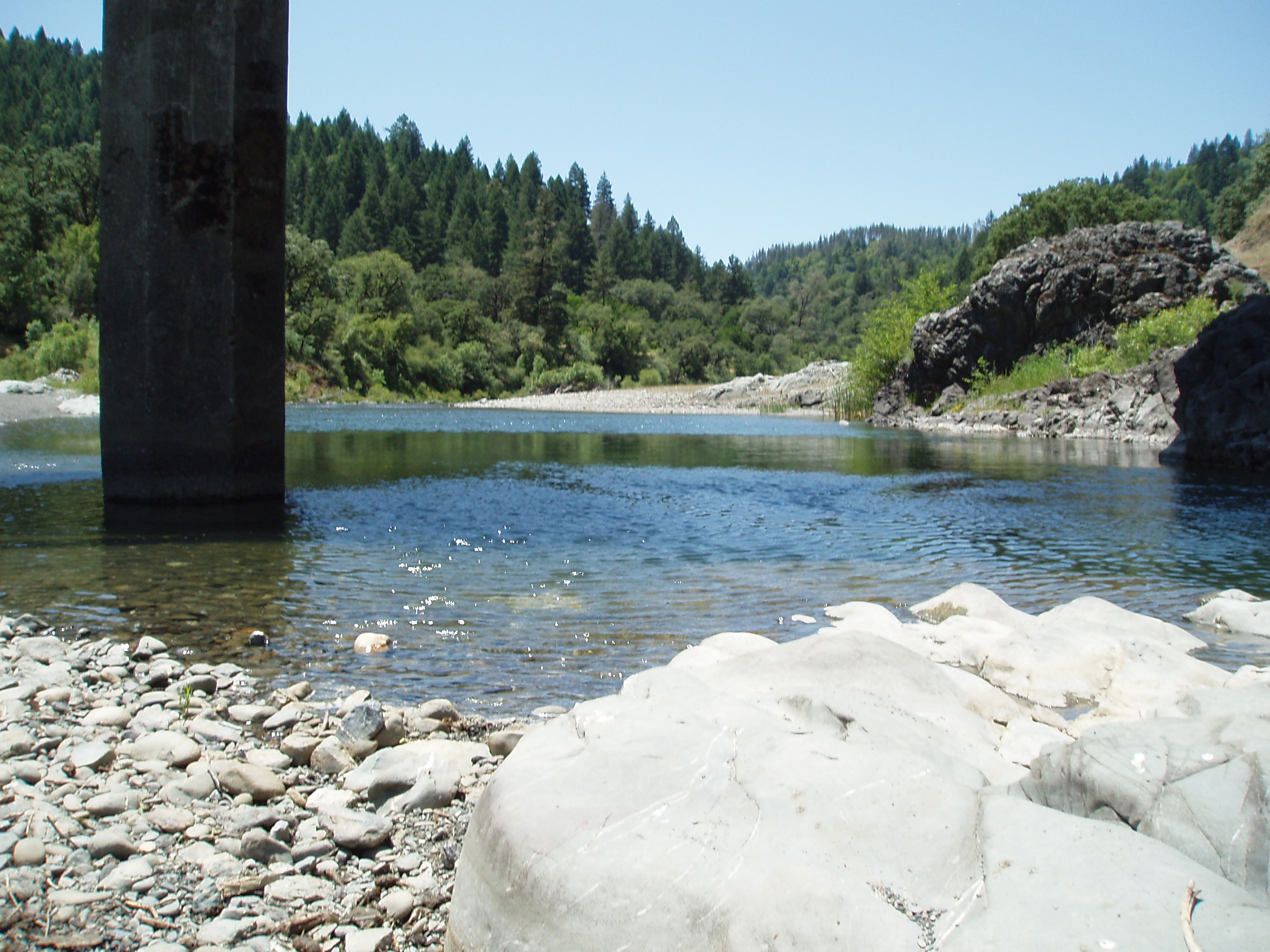Charles Olson at the Eel River, Hearst, California

(All quotations with page numbers are from Charles Olson, The Maximus Poems)
Seated by this shallow river
at what was its deep and mid point
in December…
The birds sound the same…
What was I thinking this morning?
When the wind dies down
though the water keeps moving and changing
the surface smooths, far hills reflect in it
with leaves, without snow. Then another
wind, a different course of air stirs the
surface up into a color blend.
Sound of only wind and water.
Then tractor sounds above and past
the trees on a ridge.
In an earthquake this bridge could easily come down.
The river would embrace it.
(Or Verazano has it,
courously, put down as
a mud bank
p. 83
Appears a group of young women with small children
mostly naked, only bush and nipples covered
and lie along the river shore facing me
or wade into the water.
They peer curiously over at me.
The group moves somewhat closer,
all three lie facing me. The tops come off.
Infants’ laughter. Bird songs.
Just like that dragging
as we do
shifting new
land, sucks
down, into the terrible
inert of
nature (the Divine
Inert, the literary man…
p 126
Now some guy walks up 20 meters away
and tosses his fishing line in the water, looking over
at me as though he wants my spot.
I smile at him.
Didn’t think Friday would be so eventful down here.
(Sat down, planted
fisheries
so they’ve stayed put
p 128
The women put their tops back on
and turn to face the other way.
(We kill
as a fisherman’s
knife nicks
abundance.
p 129
The fisherman suddenly leaves. Seems to feel
unwanted, angry, drives off with skidding wheels.
The women turn back toward me, and take their tops
off again. The only sounds are wind and water.
(if we
don’t find out the inert
is as gleaming as,
and as fat as,
fish —
p 130
Tops back on, walking the kids
toward me indirectly, on my blind
side then skirting around behind and
away down river as I write.
(aloof, aloof
and came no near
new cry
p. 131
I eat a sesame & poppy cracker
w/ camembert.
A car, blasting hip-hop
through its speakers,
stopped on the
bridge
for approximately
20 seconds.
Put the camembert away.
Eat the second cracker.
(Stop
right there, said time, Descarte
‘s holding up
another hand and your own people
in this wilderness
not savages but thought
has invaded
the proposition.
p. 134
Behind me
dogs with large voices bark
at the returning women and infants.
New women’s voices raised at the dogs.
Then skirting very close to me
three women, each with a dog
single file, prim, reserved along the river
each with a dog.
In front is Black Dress, black shoes, tattoos
then Shorts, very short shorts, wearing sandals.
Shorts has to restrain her dog as she passes:
he wants to visit with me, check me out,
be my friend, I smile, say,
“he wants to visit” she smiles back
and giggles a yes then sways her hips
the rest of the way down the river
single file behind her companions.
(Coming along paths
we just now
get our feet on, that space”
p. 135
Then the wind, the birds, the river, the trees
shaking and dancing in the wind
until the child human voices enter
angry this time, upset, unhappy
then the voices of the mothers shushing
and scolding. It looks like I’ll be
alone again shortly.
(The wind had veered to
the northeast and was
increasing p. 140
(2012; Previously published as “Narrative Plaything: Reading Olson at the River)
